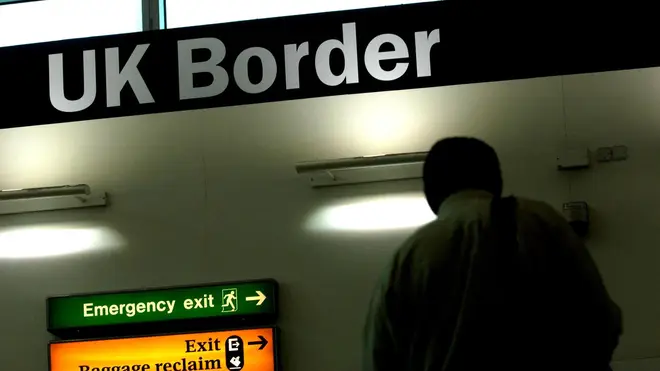
Richard Spurr 1am - 4am
8 January 2021, 08:46 | Updated: 8 January 2021, 09:27

International travellers will need to show a negative Covid-19 test before being allowed England and Scotland as part of efforts to tighten border controls to stop the spread of new variants of the disease.
But how will it work, who is exempt and what issues might you expect if you need to travel?
The Government announced that the new rules will take effect next week.
Grant Shapps told LBC today that this was to "avoid a repatriation crisis".

Grant Shapps explains new UK border Covid measures
UK nationals, as well as foreign citizens, will need to produce a negative test result taken less than 72 hours before travelling to the UK or face a £500 fine in border spot checks.
Yes. Arrivals still need to quarantine for 10 days, even with a negative result - unless you come from somewhere which is deemed "low risk", according to the Government's own guidance.
The 10 day period can be reduced to five days if people get tested.
The rules officially apply to England and Scotland. Ministers are said to be working closely with leaders from Wales, and Northern Ireland.
Nicola Sturgeon is adopting the same plan but it will not change current rules which make non-essential travel to and from Scotland illegal.
Read more: International arrivals at England and Scotland to need negative Covid test

Grant Shapps explains new UK border Covid measures
Current testing requirements for hauliers, in which drivers wishing to enter France from Britain must show proof of a negative Covid-19 test taken in the previous 72 hours, will continue, the Department for Transport (DfT) said.
Following discussions on Thursday, the DfT said the French Government made the decision to keep current measures in place until further notice.
The DfT said arrangements would be reviewed regularly after French authorities closed the border to the UK last month and subsequently reopened it to hauliers on the condition of a negative Covid-19 test on December 23.
Transport Secretary Grant Shapps has said introducing the requirement for passengers to have a negative test before arrival into England and Scotland became "much more urgent" because of new coronavirus strains.
"There are the concerns about the South African one in particular about how effective the vaccine would be against it so we simply cannot take chances," he said.
Passengers travelling from a number of southern African countries will be banned from entering England, the Department for Transport (DfT) announced on Thursday, to prevent the spread of the new Covid-19 variant detected in South Africa.
They include Namibia, Zimbabwe, Botswana, Eswatini, Zambia, Malawi, Lesotho, Mozambique and Angola - as well as Seychelles and Mauritius.
The ban excludes British and Irish nationals, longer-term visa holders and permanent residents, who will be able to enter but be required to self-isolate for 10 days with their household.
Botswana, Seychelles and Mauritius were removed from the travel corridor list, with passengers arriving in the UK from these countries from 4am on Saturday required to self-isolate.
Israel was also removed from the list following a "sustained and accelerating increase" in cases, "similar in trajectory to the UK", the DfT said.
Read more: Police hunt man who injected woman, 92, with fake Covid vaccine

PM: The NHS is under pressure and we all have to do our bit
His comments came as the Government extended travel restrictions for neighbouring countries of South Africa, where a current travel ban is in place, and removed Israel from the travel corridors list.
Sadiq Khan told Transport Secretary Grant Shapps it is "absolutely vital that robust procedures are urgently implemented" to ensure that international arrivals do not undermine efforts made by Londoners to contain the virus.
The mayor highlighted quarantine and testing measures currently in place for people arriving in Singapore, Australia and Canada as an example of what is being done elsewhere.
In a letter to Mr Shapps, he said: "The Government has now taken action to suspend direct flights from South Africa, but it has never been clear why a more rigorous approach was not taken earlier to reduce the risk from imported infections or how we avoid importing infections from indirect routes.
"We now urgently need much stronger procedures, such as have been introduced by many other countries, to be applied much more widely, if we are to contain these risks, including the introduction of new strains."
Mr Khan is calling for much more rigorous testing, such as passengers requiring an accurate negative Covid-19 test result from a sample taken no more than 72 hours before travel, and a Covid-19 test on arrival that meets a nationally set standard.
Heathrow airport’s chief executive, John Holland-Kaye, said: “Having called for the introduction of pre-departure testing since last April, we support this development which ensures passengers can continue to travel safely. The government must now prioritise the creation of a common international standard for testing that would introduce a global process to protect confidence in future travel.”